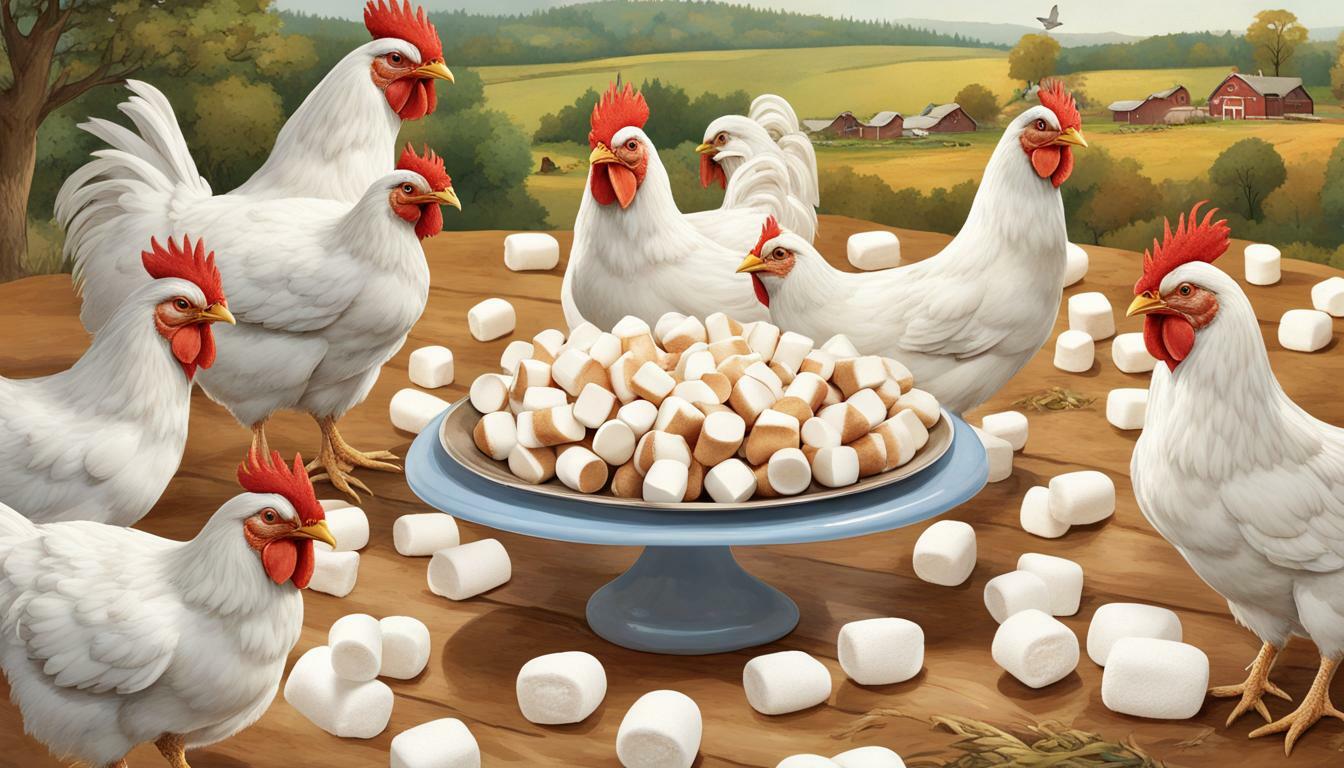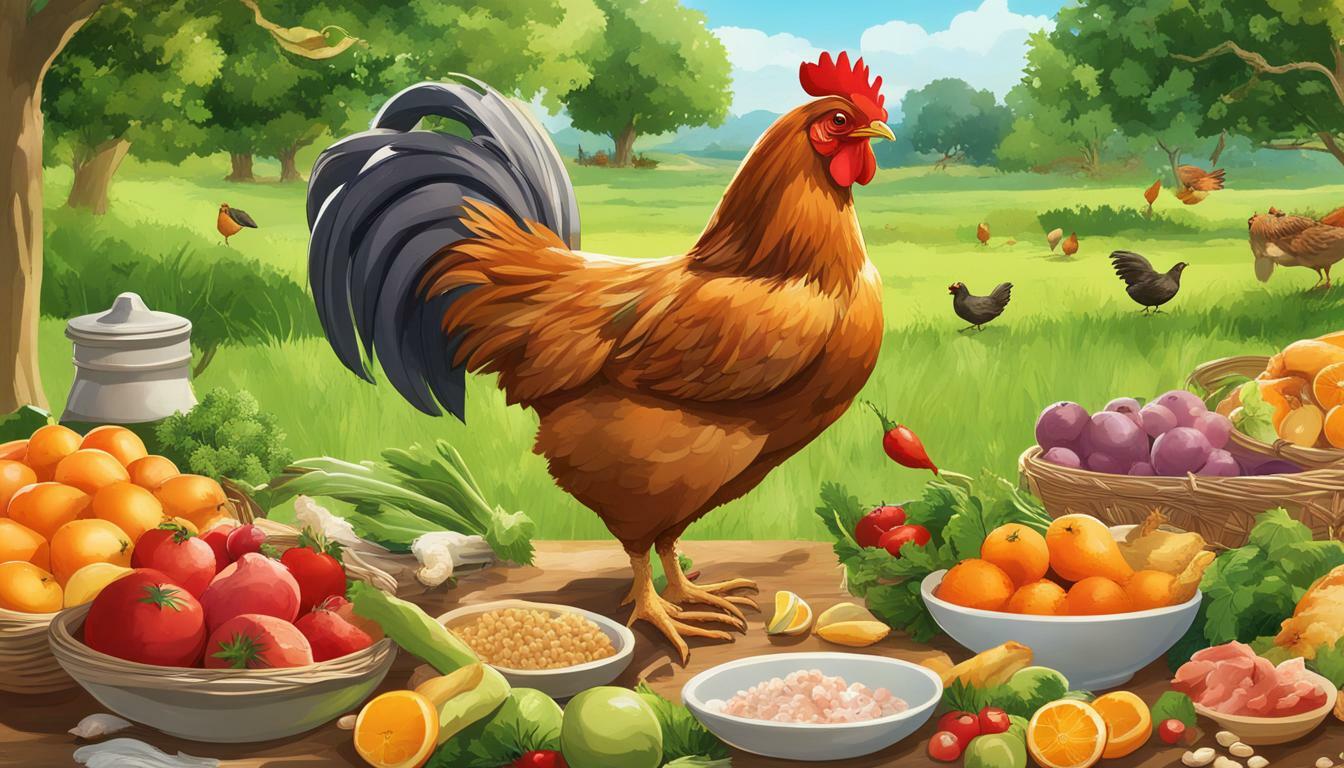Can Chickens Eat Marshmallows?

Table of content:
- Are Marshmallows Safe for Chickens to Eat?
- What Happens If Chickens Eat Marshmallows?
- Why Can’t Chickens Eat Marshmallows?
- What are the Risks of Feeding Chickens Marshmallows?
- Should You Give Marshmallows to Chickens as a Treat?
- Are Marshmallows Bad for Chickens?
- What Human Foods Can Chickens Eat?
- What Snacks Can You Give to Chickens?
- Conclusion
- Final Thoughts
Many chicken owners wonder if treats like marshmallows are safe for their feathered pets. Chickens seem to enjoy pecking at new, tasty snacks. But are marshmallows a responsible treat choice for backyard chickens? Let’s take a closer look at what happens when chickens eat marshmallows.
Are Marshmallows Safe for Chickens to Eat?
Marshmallows may look tasty, but they provide no nutritional value for chickens. The main ingredient in marshmallows is sugar. Chickens have a sweet tooth and will readily eat foods high in sugar. However, too much sugar is unhealthy for chickens.
The high amounts of sucrose and glucose in marshmallows can cause digestive upset in chickens. Chickens do not have the proper enzymes to break down large amounts of sugar. Their digestive systems are not designed to handle excessive sugars or simple carbohydrates well.
Too much sugar can also lead to obesity, liver problems, diabetes, and other health issues in chickens. Marshmallows provide empty calories and no vitamins, minerals, or protein. So it’s best to avoid feeding marshmallows to chickens on a regular basis.
What Happens If Chickens Eat Marshmallows?
If chickens eat a few marshmallows occasionally as a treat, it likely won’t cause immediate health problems. But over time, regularly feeding chickens marshmallows can lead to the following issues:
- Digestive problems like diarrhea, bloating, and intestinal upset
- Decreased appetite for healthy foods
- Weight gain and obesity
- Fatty liver syndrome
- Diabetes and insulin resistance
- Increased susceptibility to bacteria, viruses, and disease
- Molting difficulties and decreased egg production
- Generally poor health over time
Consuming too many marshmallows can also pose a choking risk for chickens. Marshmallows are sticky, soft, and can clump together easily. They may not be adequately chewed and can get lodged in a chicken’s throat, crop, or digestive tract.
For all these reasons, moderation is key when offering marshmallows to chickens. They should only be an occasional snack, not a dietary staple.
Why Can’t Chickens Eat Marshmallows?
To fully understand why chickens can’t eat unlimited marshmallows, let’s break down the nutritional makeup of marshmallows:
Sugar Content
- Marshmallows contain very high amounts of sugar, upwards of 70-80% sugar by weight. This sugar is in the form of sucrose, glucose, and corn syrup.
- Chickens do not produce salivary amylase, the enzyme needed to begin breaking down simple sugars and starches.
- Too much sugar overwhelms the limited enzymes chickens possess for sugar digestion and absorption.
- Excess sugar ferments in the digestive tract, leading to diarrhea, gas, and pain.
Lack of Nutrition
- Marshmallows contain minimal nutritional value beyond empty calories from sugar.
- No protein, fiber, vitamins, or minerals are present. Chickens need balanced nutrition to stay healthy.
Can Cause Obesity
- With little protein or fiber and many fast-digesting carbohydrates, marshmallows can easily lead to weight gain in chickens.
- Obese chickens are prone to joint issues, heart problems, liver disease, egg-laying issues, and respiratory disorders.
May Lead to Fatty Liver Disease
- The high sugar content combined with a lack of protein or fat can contribute to hepatic lipidosis or fatty liver disease in chickens. This dangerous condition can lead to liver failure and death.
For all these reasons, marshmallows are simply not an appropriate food source for chickens. There are many healthier treatment alternatives to provide instead.
What are the Risks of Feeding Chickens Marshmallows?
Beyond the nutrition-related issues above, feeding chickens marshmallows poses a few other risks and hazards:
Choking Hazard
The sticky, soft texture of marshmallows means they clump together easily. Chickens may try to swallow chunks that are too large and subsequently choke. Always monitor and treat time closely.
Salmonella Contamination
Marshmallows aren’t typically thought of as a Salmonella risk. However, they can harbor bacteria if not produced, transported, or stored properly. Salmonella can multiply quickly in sugary environments.
Rodent Attraction
Excess marshmallows not eaten by chickens can attract unwanted mice, rats, and other pests to the coop. These rodents spread disease and parasites to chickens in close quarters.
Diarrhea and Dehydration
Too much sugar from marshmallows draws fluid into the intestine via osmosis. This can cause diarrhea, which risks dangerous dehydration and electrolyte imbalances in chickens.
Obesity and Liver Disease
As mentioned, regularly overfeeding sugary snacks like marshmallows contributes to obesity, hepatic lipidosis, diabetes, and other metabolism conditions over time.
Moderation and proper storage of marshmallow treats minimize these risks when occasionally feeding chickens. But avoiding marshmallows altogether is the safest approach.
Should You Give Marshmallows to Chickens as a Treat?
Marshmallows may seem like a fun treat to toss to chickens in small amounts. But given the nutritional makeup and risks, they aren’t an optimal choice.
If you wish to give your flock a special snack now and then, one marshmallow per chicken once a month is the absolute maximum that could be considered. Even this modest amount should be given with caution and close monitoring of your chickens’ health.
Never feed chickens a full bag of marshmallows or allow free access to them. The sugar overload can quickly cause digestive upset and diarrhea. For the healthiest treatment alternatives, keep reading.
Are Marshmallows Bad for Chickens?
Marshmallows are not as highly toxic or immediately deadly to chickens as some substances are. But they can definitely contribute to long-term health consequences when fed regularly or in excess.
Marshmallows essentially provide zero real nutritional benefits to chickens beyond sugar calories. And too much sugar can unbalance gut bacteria, cause weight gain, and tax the liver.
Given how unhealthy they are for chickens, marshmallows should be considered unsuitable as anything beyond the rarest of treats.
What Human Foods Can Chickens Eat?
While marshmallows aren’t ideal for chickens, there are many healthier “people foods” chickens can enjoy in moderation, such as:
- Fruits like berries, melon, banana, apple, citrus slices (remove seeds)
- Vegetables like leafy greens, broccoli, carrot, squash, sweet potato
- Cooked oatmeal, brown rice, quinoa (no seasoning)
- Plain yogurt (provides probiotics)
- Cheese in small amounts
- Scrambled or hard-boiled eggs
- Unsalted nuts and seeds
- Shredded chicken, turkey, or fish (cooked, unseasoned)
When introducing new foods, go slowly to allow chickens’ digestive systems to adjust. Provide bite-sized pieces and never more than a handful per chicken as a supplementary treat.
Always avoid seasoning, salt, sugars, oils, sauces, and other additives meant for human consumption when feeding chickens table scraps. Stick to plain, natural foods their bodies recognize.
What Snacks Can You Give to Chickens?
In addition to healthy leftovers, there are several purpose-made snack options for chickens that provide more nutritional benefits than marshmallows:
- Mealworms – high in protein, great for treats
- Chopped hard-boiled eggs – an excellent source of protein
- Unsweetened cereal/granola – opt for low-sugar kinds
- Chicken scratch mix – a blend of grains and seeds
- Chickens’ greens or salad mix – provides fiber and vitamins
- Oats groats – more fiber than whole oats
- Dried herbs – small amounts provide a variety
- Chopped greens and vegetables – leafy greens, carrots, squash, etc.
- Fresh berries – loaded with antioxidants
As always, variety and moderation are key when supplementing your flock’s usual feed with treats. Avoid overdoing high-fat or sugary snacks. Prioritize more wholesome, natural options like those listed here.
Conclusion
Backyard chicken owners must make responsible decisions regarding treats and table scraps to keep their flocks healthy and thriving. Though chickens may find marshmallows irresistible, their nutritional makeup makes them inappropriate as anything more than the occasional nibble.
Far better snack alternatives exist that provide more benefits and less risk. Always research any new food thoroughly before sharing it with your chickens. Their digestive systems differ greatly from humans, so what may seem like a fun indulgence to us can cause them serious health issues over time.
When in doubt, stick to a high-quality complete feed, supplemented by a variety of fresh treats in moderation. This combination gives chickens the best nutrition possible to support their dietary needs. Robust, happy chickens will reward you with plentiful eggs and vibrant good health.
Final Thoughts
Marshmallows are no replacement for proper chicken nutrition. While the occasional marshmallow given as a rare treat isn’t likely to cause immediate issues, regular overindulgence can contribute to obesity, liver disease, digestive troubles, and other long-term health consequences. Healthier snack alternatives abound for chickens. Always research any new food thoroughly and feed treats in extreme moderation. In short – yes, chickens can eat marshmallows, but that doesn’t mean they should. A varied, balanced diet optimized for poultry health is the best way to keep your backyard flock thriving.
Welcome. I’m Adreena Shanum, the proud owner of this website, and I am incredibly passionate about animals, especially poultry. I founded adreenapets.com as a labor of love, stemming from my desire to share my knowledge and experiences with poultry enthusiasts worldwide.




